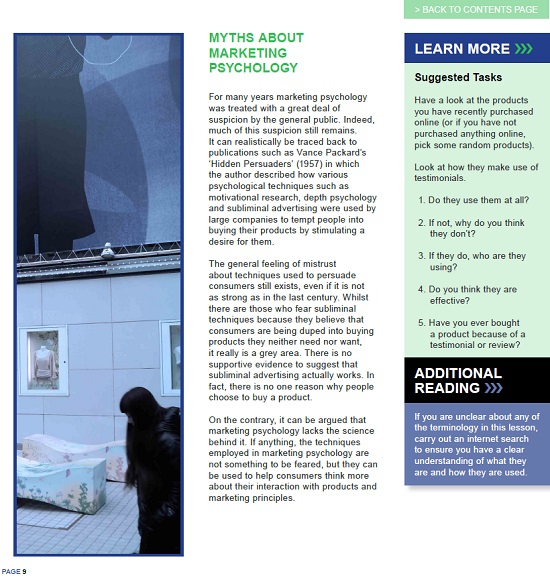Learn How Your Customers Think
Understand what prompts people to do business with you (or not)
This course is all about being able to make a sale more often.
When you understand people’s purchasing behaviour; you know the buttons to push in order to get a reaction -and ultimately a sale.
As such this course is particularly useful for anyone wanting to work in:
- Sales
- Marketing
- Public Relations
- Advertising
- Running their own small business
- Retail
- Running an online business
As you progress through each lesson; you will be provided with a range
of ways you can expand your learning. By choosing what tasks you do and
don't undertake; you can expand in areas that interest you most, and
skip areas of less interest.

This 20 hour short course covers 6 lessons that help you understand how
consumers think and how to ensure this benefits your business' marketing
plans and ultimately your bottom line. The topics covered in this short
course include what is marketing psychology, who we sell to-
understanding the consumer, the psychology of consumer behaviour, market
research techniques, where we sell and how we sell- advertising and
marketing.
Once you understand more about your customers, you will be able to make more informed strategic decisions about your business and the direction that your marketing needs to take.
At the end of each lesson, you will be given a short interactive test to
undertake, which will provide an indication of how your learning is
progressing. Upon completing the very last lesson, you will be offered a
more thorough automated test or examination. This final assessment can
be undertaken at any time of day or night; and any day of the week; and
if you achieve an overall pass; you will be able to obtain a
"certificate of completion" with your name and completion date on it.
The Lessons
LESSON 1 WHAT IS MARKETING PSYCHOLOGY?
An Overview
Roles in Marketing Psychology
Qualifications and Jobs
Applications of Marketing Psychology
Myths About Marketing Psychology
Future Directions
Review What You Have Been Learning
LESSON 2 WHO WE SELL TO - UNDERSTANDING THE CONSUMER
Principles of Marketing Psychology
The Buying Process
Target Market
Geographic
Demographics
Psychographics
Other Influences on Consumers
What We Sell
Review What You Have Been Learning
LESSON 3 PSYCHOLOGY OF CONSUMER BEHAVIOUR
Introduction
Gestalt Principles of Perception
The Iceberg Principle
The Dynamic Principle
Emotions and Buying Behaviour Response
The Meaning of Colours
Review What You Have Been Learning
LESSON 4 MARKET RESEARCH TECHNIQUES
Introduction
Gathering Data
Testing Products
Testing Advertisements
Market Segmentation
Review What You Have Been Learning
LESSON 5 WHERE WE SELL
Shops
How People Purchase Stock Items
Online
Tips on Where to Sell
Review What You Have Been Learning
LESSON 6 ADVERTISING AND MARKETING – HOW WE SELL
Ethics of Advertising and Marketing
Review What You Have Been Learning
FINAL ASSESSMENT
Features:
- Enrol any time of day or night.
- Start studying immediately or later (as you wish).
- Configure your study sessions at any length and frequency you wish.
- Work through at your own pace.
- Help desk- contact our help desk here with the subject title: 'Help Desk Short Course'.
- Automated
self assessment tests pop up at the end of each lesson. You can attempt
these as many times as you wish; and each time, upon completion, you
can see your results. You will need internet access to complete the self assessment tests.
- At the end of the whole course, you
are presented with a major automated examination which can be attempted
online, anywhere, anytime.
- If you achieve a 60% pass in the exam; you immediately receive a downloadable certificate of completion with your name on it.
Sample Pages from the Course



NEVER ASSUME CUSTOMERS ONLY THINK ABOUT PRICE
Customers are more discerning and sophisticated than in the past when it comes to making purchasing choices. With more disposable income, a wide range of factors can influence a customers behaviour more than cost: from quality and convenience through to ethics.
Here are some things which today’s customer may consider for example:
- They may demand more information than they would in the past. sales staff needs to be knowledgeable in what they are selling. Staff may need to know all about the environmental source of a specific product or material, its manufacturing technique (e.g. emissions, pollutants), any known health risks associated with its use, the wellbeing of labourers involved in its manufacture of processing – or have instant access to that sort of information.
- Know more about what they are buying and where they can buy it from. They will be more aware of YOUR competition. Google and social media have made customers more product savvy. If you don't stock any ethically sourced options they may know who does, and choose them over you.
- Change their minds about what they choose to buy. Demographics are changing: retirees downsizing, more apartment dwellers, people building houses on much smaller blocks. If they cannot find a product which meets their needs they may just not buy at all.
- Demand assurances they can trust. For example, in clothing manufacturing it is often difficult to convince people that fabrics are ethically sourced and made. If there is doubt, shoppers are more likely to buy from small businesses that make their own clothing using ethically sourced fabrics.
- Demand quality over quantity. Cheaper items, often of low quality, usually mean that somewhere in the manufacturing chain there are employees who are not being paid fairly. Many people prefer to pay more for better quality and look for assurances such as organic produce, ethically sourced, sustainable practices, a fair or living wage, etc.
- Spend more time reading product labels. Ethical shoppers are likely to read labels in detail and require labels which address their concerns. Having a good labelling system which addresses key points and shows you care will win over confidence.
- Prefer businesses and sales staff who are transparent. If you try to mislead customers or are sparing with the truth about your product supply chain you are likely to push customers away. It is better to say you don't know or cannot guarantee than to make false claims about sustainability, ethical practices, etc.
- Share their shopping experiences with friends and colleagues. Ethical shoppers are more likely than other shoppers to share how their shopping experiences went and their interactions with sales staff.
- Develop loyalty to goods or services. They will wear ethically made clothing with pride, return to buy environmentally friendly building products for their next DIY project, and so forth. They will also recommend a business, products or services which meet with their values and belief systems because they want to spread the word.
- Search for ethical products online. The ability to home shop means ethical shoppers can search worldwide if necessary to find products which meet with their needs. Sales staff may need to be aware of online competition as well as how to interact with customers form different cultures and backgrounds.
Sales staff must know how to target customers and offer solutions that suit the demographic and their lifestyle. They must be knowledgeable across a very broad spectrum – they should have training and some sort of qualification to back them up.
THIS COURSE HELPS YOU TO UNDERSTAND THE CUSTOMER SO MUCH BETTER, AND THAT IS A SKILL EVERY MARKETING OR BUSINESS PROFESSIONAL CAN BENEFIT FROM
Support Along the Way from Experts
You have access to expert
tutors through our student help desk all the time you are studying this
course. Our school maintains help desks in both of our offices -in
Australia and the UK; and has staff on duty five days a week manning
phones, online chat and emails. Any questions that you have about what
you are studying will be dealt with promptly (usually the same working
day, often immediately).
If there is something you read or research that you don't understand, ask for help.
If you want to learn more about something you encounter through these
studies, have a conversation with one of our faculty tutors.
If you need direction to find more information, ask.
If you need advice on moving forward with your work, career or studies
after the course ask. (Free career and business advice).